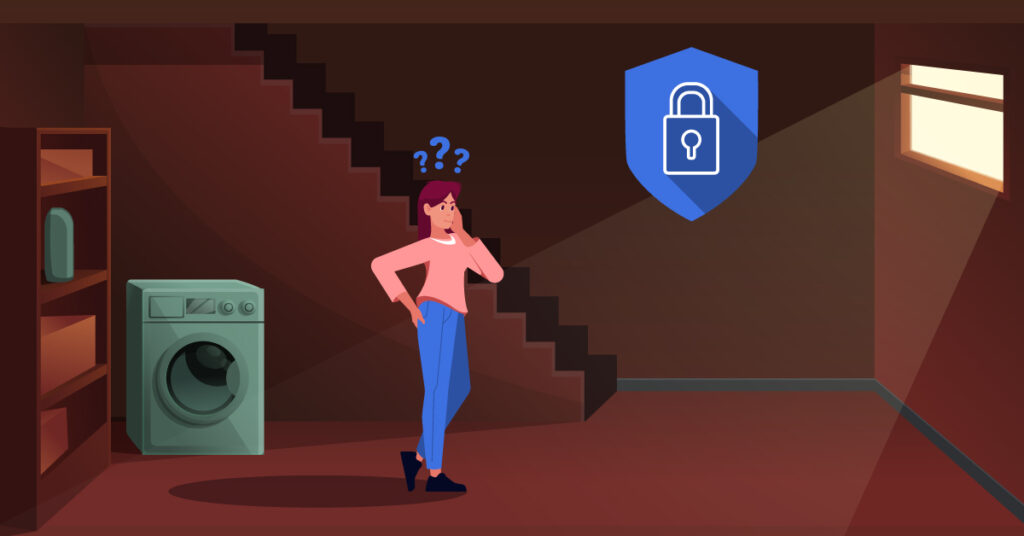Basement windows are often an overlooked aspect of home security. These windows, typically located close to ground level, can provide an entry point for burglars or intruders if not adequately secured. Ensuring that your basement windows are as secure as the rest of your home is essential for comprehensive protection. In this blog post, we’ll discuss the best security for basement windows, from window coverings and locks to alarm systems and window well covers.
7 Reasons To Secure Your Basement Windows
Did you know that a break-in happens almost every 30 seconds in America? With over half of those break-ins being in homes, being proactive in protecting you and your family is important. Not only will securing your basement windows help in protecting your home, there are a few other benefits you might not have thought of that we will outline below.
- Vulnerability to break-ins: Basement windows are often located close to the ground and hidden from plain sight, making them an attractive target for burglars and intruders. Ensuring that these windows are secure can help prevent unauthorized entry and protect your home, belongings, and family.
- Privacy: Basement windows can provide a view into your home, potentially revealing personal information or valuable possessions to outsiders. By securing your basement windows with window coverings or privacy films, you can maintain your privacy and discourage potential intruders from targeting your home.
- Safety and emergency escape: In case of an emergency, such as a fire, basement windows can serve as an escape route. Ensuring that these windows are secure yet easily opened from the inside can help keep your family safe in emergencies.
- Energy efficiency: Properly secured basement windows can help improve your home’s energy efficiency by preventing drafts, reducing heat loss in the winter, and keeping your home cooler in the summer. This can lead to lower energy bills and a more comfortable living environment.
- Pest control: Unsecured basement windows can provide an entry point for pests like rodents, insects, and other unwanted creatures. Securing these windows can help keep pests out of your home and maintain a cleaner, healthier living space.
- Weather protection: Securing your basement windows with well-fitted covers or reinforced glass can help protect your home from extreme weather events, such as storms, high winds, or flooding. This can prevent costly damage and maintain the structural integrity of your home.
- Peace of mind: Knowing that your basement windows are secure can provide you with a sense of safety and peace of mind. By taking the necessary precautions to secure these windows, you can rest assured that your home is protected from potential threats.
Top Security Options For Basement Windows
Here are the top eight ways to protect your basement windows and rest easy knowing you are making it much more difficult for an intruder to get into your home.
Rearrange Your Space
This might seem silly, but many homeowners place their couches or tables near windows for the best light. Unfortunately, this makes it extremely easy for an intruder to step down from the window and make a quick getaway once they are done.
Instead, move your furniture to the middle or the side of the room, away from a window, to make it much harder for an intruder to get inside easily. If they do get inside, they will then be greeted with a multi-foot fall versus a handy/cushy step-down.
While you are rearranging your basement furniture layout, make a note of the valuables and move them further away from the window as well. If an intruder can’t see something valuable close to the window, that could deter them from breaking in. Items like TVs, gaming systems, and tools/workbenches are hot ticket items in home robberies.
Window Coverings
One of the simplest ways to improve the security of basement windows is to install window coverings. By obscuring the view into your basement, you can deter potential intruders from targeting your home.
Here are some window coverings that can be used for basement windows.
- Curtains or drapes: Heavy, opaque curtains or drapes can help prevent anyone from seeing into your basement. Ensure that the curtains are made of a thick, durable material to provide the best protection.
- Window film: Privacy window films can make it difficult for outsiders to see into your basement while still allowing natural light to enter. These films come in various styles, from frosted to decorative patterns, and are relatively easy to install.
Motion Lights
Motion-activated lights, also known as motion sensor lights, can be an effective security measure for basement windows. They work by detecting movement within a specific range and automatically turning on when motion is detected. This sudden burst of light can startle potential intruders, making them think twice about attempting a break-in.
Motion sensor lights are available in various styles, including floodlights, wall-mounted lights, and solar-powered options. Consider your home’s exterior design and the specific needs of your basement windows when selecting the appropriate type of motion light.
When selecting a motion light, consider its sensor range and sensitivity. Look for lights with adjustable sensitivity settings to avoid false triggers, such as those caused by small animals or wind-blown debris. A wider sensor range can cover a larger area, providing more comprehensive security for your basement windows.
Proper installation and positioning of your motion lights are crucial for their effectiveness. Install lights high enough to be out of reach for potential intruders while ensuring they adequately illuminate your basement windows and the surrounding area. Make sure the motion sensor is pointed toward the most likely approach path for intruders so it’s triggered when someone approaches the window.
If you have a home security system, consider integrating your motion lights with the system. This can provide additional layers of protection, such as triggering an alarm or alerting you via smartphone when motion is detected near your basement windows.
Window Locks and Security Bars
Installing high-quality locks and security bars on basement windows is another effective way to deter intruders. There are several options available to suit different types of windows:
- Window locks: Choose locks specifically designed for your window type (sliding, casement, or double-hung). Deadbolts or key-operated locks can provide an added layer of security.
- Window security bars: Installing security bars on the interior or exterior of basement windows can prevent intruders from entering, even if they manage to break the glass. Choose bars that are made from durable materials like steel and have a quick-release mechanism for easy exit in case of an emergency.
- Window pin locks: For double-hung windows, installing window pin locks can prevent the window from being opened from the outside. These locks are simple to install and can be easily removed from the inside if needed.
Glass Break Sensors and Window Alarms
Incorporating glass break sensors and window alarms into your home security system can provide an additional layer of protection for basement windows. These devices can help detect attempted break-ins and alert you or your security monitoring company to the potential threat.
- Glass break sensors: These devices detect the sound of breaking glass and trigger an alarm when activated. They can be mounted on walls or ceilings near basement windows and are typically connected to your home security system.
- Window alarms: Window alarms are designed to alert you when a window is opened or tampered with. They can be standalone devices or integrated into your existing home security system. Some window alarms come with built-in glass break sensors for added protection.
Window Well Covers
Window well covers can serve multiple purposes when it comes to basement window security. They not only prevent intruders from accessing basement windows but also help keep debris, leaves, and pests out of the window wells.
- Clear polycarbonate covers: These covers are made from durable, impact-resistant material and allow natural light to enter your basement while keeping intruders out. Look for covers with built-in locks or fasteners for added security.
- Grate-style covers: Grate-style window well covers are made from metal bars or mesh and provide a strong barrier against intruders. Ensure that the cover is securely fastened to the window well, and consider adding a padlock for extra protection.
Security Cameras
Installing security cameras near basement windows can act as a deterrent to potential intruders and provide valuable evidence in case of a break-in. Consider these factors when selecting and installing security cameras for your basement windows:
- Camera type: Choose between wired or wireless cameras based on your home’s setup and your security needs. Wired cameras typically offer more reliable connections, while wireless cameras can be easier to install and move if necessary.
- Camera features: Look for security cameras with features like night vision, motion detection, and high-resolution video recording to ensure the best possible coverage of your basement windows.
- Camera placement: Position cameras to provide a clear view of your basement windows and the surrounding area. Ensure that cameras are installed outside the reach of potential intruders and are protected from the elements.
- Remote monitoring: Many security cameras offer remote monitoring capabilities, allowing you to view live or recorded footage from your smartphone or computer. This can provide added peace of mind and allow you to respond quickly in case of a security breach.
Reinforced Glass
Reinforced glass is a type of glass that has been specially treated to enhance its strength and durability, making it an excellent security option for basement windows. Several types of reinforced glass can be used to protect your basement windows from break-ins and improve their overall security.
- Laminated glass: Laminated glass consists of two or more layers of glass bonded together with a tough, clear plastic interlayer, typically polyvinyl butyral (PVB). This interlayer holds the glass together when it’s shattered, making it more difficult for intruders to break through. Laminated glass also offers added benefits, such as sound insulation and protection from harmful UV rays.
- Tempered glass: Tempered glass is heated to a high temperature and then rapidly cooled, resulting in a glass that is four to five times stronger than regular annealed glass. If broken, tempered glass shatters into small, relatively harmless pieces rather than large, sharp shards, making it a safer option for basement windows. However, once tempered glass is broken, it can still be breached, unlike laminated glass, which remains intact due to the interlayer.
- Impact-resistant glass: This type of reinforced glass combines the benefits of both laminated and tempered glass. It consists of multiple layers of glass, often with a combination of tempered and laminated panes, providing added strength and resistance to breakage. Impact-resistant glass can withstand significant force and is more difficult for intruders to break through.
Securing basement windows is an essential component of a comprehensive home security plan. By implementing a combination of window coverings, locks, security bars, alarms, window well covers, and security cameras, you can effectively deter intruders and protect your home and family.
When selecting security measures for your basement windows, consider your home’s unique needs, layout, and budget to ensure the best possible protection. With the right security options in place, you can have peace of mind knowing that your basement windows are just as secure as the rest of your home.
You might also be interested in: How To Get Rid Of Spider Webs & Other Bugs On Security Cameras In 5 Steps




